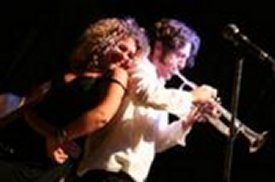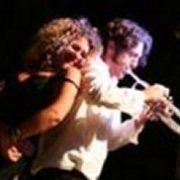Opa Cupa
Opa Cupa!
with guest vocalist, Eva Primack
Live at Boulevard Music

As the boundaries between some countries become more strictly enforced, the borderlines continue to blur between international music. What was once considered almost the outlaw music of the gypsies is now stealing its way overseas into the American music mix by way of the internet, amalgams of expatriates, and local musicians who have traveled the caravan routes. Maybe just being a musician today is to be a gypsy of sorts, and the cyber world allows for wandering freely across musical perimeters. Exposure to what was once obscure, esoteric, lost, or dying music is now available for the masses.
One of the new exports from southern Italy making noise in world music circles, is Opa Cupa, a brassy beat group, more a collective than a set band, which absorbs the traditional music of the Balkans, picks up big chunks of jazz, stirs in their own Albanian bloodlines, and blasts out a fiery blend of high-octane mega-gypsy music. The name, Opa Cupa (pronounced opa tzupa), is a shout of exhortation to dance used by gypsies of South-Eastern Europe.
The take no prisoners approach of Opa Cupa's live act comes at you in a spirited display of virtuosity and passion. If you were in the packed house at Boulevard Music for Opa Cupa's combustible music, you were witness to a crossfire of dynamism smoldering then exploding layer upon layer of fierce interplay and, seemingly, effortless solos. Imaginative rhythm structures, mostly upbeat songs and tight musicianship provided an outpouring of energy that connected with the audience.
Musical director and trumpet player, Cesare Dell'Anna pushes the group through its rapid fire paces. Plume-haired Sergio Quagliarella, has his work cut out as Opa Cupa's drummer for tempo changes and irregular rhythms are common place. A smiling Mauro Tre is the keyboard player who joyfully helps propel the music with triple-time playing. The saw doctor extraordinaire and guest violin player, Fabrice Martinez, who spearheads local wundergroup, Fishtank Ensemble, traded off tremolos with Dell-Anna's pulsating trumpet lines. Fishtank upright bass player, by way of Serbia, Djordje Stijepovic, also sitting in for the tour, brought his own special brand of gypsy bass playing by showcasing his versatility on a few solos. Djordje displayed his signature blistering slap bass often heard in his sessions with Deke Dickerson's and Slim Jim Phantom's rockabilly bands. The band performed a generous sampling from their 2006 release, Hotel Albania (11-8 Records, import). Among the highlights were Byala Stala (an arrangement of the Papasov song) and Dell'Anna's own Sotu, Sotu. Also on board to offer up her powerful pipes on several songs was Slavic Soul Party's diva, Eva Primack. This added dimension of vocals did not take away from the instrumental prowess of the group, but brought another element of potency to the already persuasive quintet especially on songs like Allegria di Naufragi (Gay Shipwrecks). Primack, almost always in motion, brought in familiar tunes which the audience, a good many local folk dancers, Balkan singers and aficionados of Eastern European culture, could relate to, if not join in on. Macedonian line dance Rumelaj and traditional Albanian dance song, Çoban Kat (The Shepherdesses) were given soulful rendition by Primack and with precise backing from the band.
Near the close of the evening's show, Opa Cupa threw in an adaptation of My Favorite Things, with Dell-Anna peppering the melody with staccato bursts on the horn. The jazz influence of this band was underscored with this tune. Although the version might not have the historical impact of John Coltrane's historic recording of the familiar Sound of Music song, the Opa Cupa interpretation was no less compelling in this setting. Rodgers & Hammerstein would most likely give their approval. And the audience gave Opa Cupa equal treatment for this number and the entire show.
One on One with Eva Salina Primack
When asked how she connected with the band, vocalist Primack responded, “I connected with Opa Cupa through Fabrice Martinez. He and I had bumped into each other a few times in the Bay Area at concerts, but it wasn't until July of 2008 that we played music together, at a concert in Santa Cruz. A few weeks later Fabrice called to ask me if I would like to come on tour with the project. I knew nothing about the musicians, the repertoire, nothing–but was completely excited to participate. I really wanted to come into the tour without expectation or projection, naïve almost, and just see what would happen. I think it was the right choice.”
In regards to which songs would be selected for her to sing with the group, she described the process.
“All the songs, with the exception of one, were already part of Opa's repertoire. I was familiar with all of them, so I did a bit of Internet sleuthing and found the lyrics for the ones I didn't already know. I sang in Albanian, Serbian, and Romanés on the tour, and also had my debut in Italian. Allegria di Naufragi, a beautiful composition of Cesare's that references the tragedy that occurred in 2002, when a boat of Albanian immigrants coming to Italy capsized and 6 of the passengers died. Singing in Italian was certainly a new experience for me, but singing about loss and struggle that is intimately linked to these traditions, people and culture filled me with many feelings; it connected me to the music and my own expression in a way I had imagined but had not yet made manifest. I brought one song to the group, probably my favorite of all Albanian songs, Çoban Kat, a well-loved song that I have sung and taught with many different musicians and to countless people over the last 7 years or so. It really took on a new form with Opa, and was very well received on our tour.”
Are there any future plans for further collaboration? “I am very, very hopeful that the answer to this is YES, though it is too soon to say what those plans are, exactly. Seeds have definitely been sown for future work, and considering the way this tour evolved from us not even knowing each other at the onset, I can't help but imagine that there are many things in store. For me, this tour was truly a joy. A wild ride, certainly, but above all, a pleasure, a joy, and an honor.”
And as far as Slavic Soul Party is concerned, would they be coming back to Southern California anytime soon? “Slavic Soul Party! We'll hopefully be on tour in California in the Spring. We have some very exciting new repertoire that we are building, turning very old songs inside out and inserting their skeletons into contemporary musical bodies… staying connected to the traditional but exposing some of the power and juice and DRIVE through their juxtaposition with sassy vocals and brass, with hip-hop, with funk, with heavy rhythm, with traditional American music… stay tuned! I will be in the Los Angeles area around New Year's, performing with Aurelia Shrenker in our duo which is officially titled Æ. Our sound is very intimate and acoustic, and our repertoire is based in the traditions of Appalachia, Caucasus Georgia, and the Balkans, with many surprises, and accompaniment on accordion Georgian panduri. We have been working for some time with our dear friends at the Museum of Jurassic Technology in Culver City, one of LA's (and the world's) finest treasures, and most likely will be giving two nights of concerts in very early January.”
More information on Opa Cupa, Fishtank Ensemble and Eva Primack can be found at: www.myspace.com/opacupa, http://www.fishtankensemble.com/, or www.reverbnation.com/fishtankensemble
Joel Okida is a struggling artist, struggling writer, and struggling musician. It occurs to him that life is all about the struggle. Fortunately, he did not take up acting. However, he's not half-bad as a zydeco dancer and the ability to make a mean gumbo and lovely walnut tortes has gotten him by.













